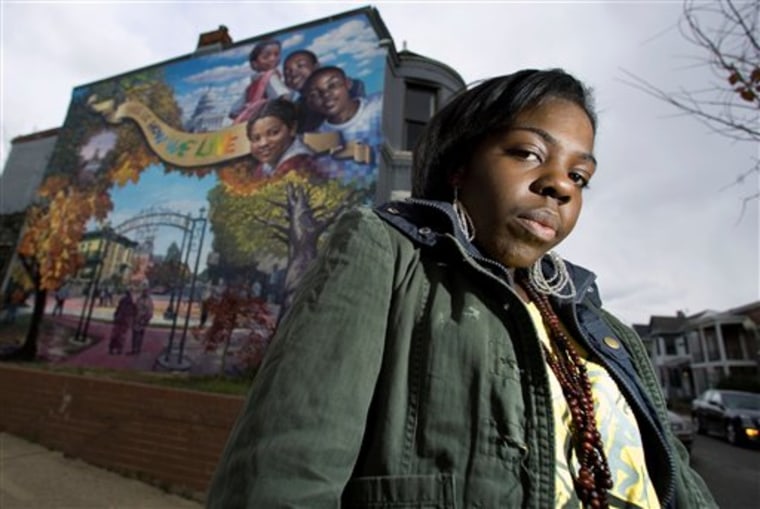The day after Barack Obama was elected president, Kari Fulton heard a white colleague proclaim that racism in America is dead.
She cringed, worrying it might be a sign of flagging interest in the fight against discrimination.
"In reality, racism is still very much alive and well," said Fulton, who graduated last year from Howard University, a historically black college in the nation's capital.
Obama's election has generated a euphoria among black Americans that is palpable. For some, the weight of history has finally been eased after generations of struggling for equality. But amid the postelection glow of racial harmony lurks a sobering fact: Racial disparities persist — in just about every measurable form — and they won't simply melt away because the nation has a black president.
Fulton, 23, was part of a group of young black activists from across the country who worked to register and turn out young black voters in the presidential election. The National Coalition on Black Civic Participation brought the group together shortly after the election to learn about converting their enthusiasm into ongoing political activism.
"Election Day was just the beginning," said Fulton, who lives in Washington and works as an organizer for the Environmental Justice and Climate Change Initiative. "People don't expect President Obama to be a superhero. We have to solve our own problems."
The problems are significant.
Quarter of black Americans in poverty
About a quarter of black Americans live in poverty — nearly three times the rate for whites — at a time when rising budget deficits and expensive corporate bailouts are going to leave little federal money for anti-poverty programs. The federal budget deficit is likely to hit a record $1 trillion next year.
Black adults are less likely than whites to have college degrees and more likely to be in prison. Blacks are less likely than whites to have health insurance and, on average, they don't live as long as whites. Homicide is the leading cause of death among black males ages 15 to 34 — and it has been for years.
The good news: Poverty and education levels for blacks have improved in the past two decades, and incarceration rates for blacks are dropping even as they increase for whites.
Still, the income gap has barely changed in 30 years, with a typical black household making only 62 percent of the income of a typical white household.
Marc Morial, president and CEO of the National Urban League, knows the numbers well. Each year, the civil rights group publishes a book called "The State of Black America," which has chapters of data on disparities between whites and blacks.
"A mere election does not change the abject conditions for African-Americans or the 230-plus years of racial injustice," Morial said.
The foreword of the 2007 edition of the book was written by Obama, then the junior senator from Illinois.
Obama: 'A long way to go'
"This sad story is a stark reminder that the long march toward true and meaningful equality in America isn't over," Obama wrote. "We have a long way to go."
In his election-night victory speech Obama talked about the historic nature of his election. But he had spent much of the campaign soft-pedaling race; he acknowledged its role in society when asked, but he rarely brought it up on his own.
Nevertheless, many black Americans, who voted more than 9-to-1 for Obama, have embraced his victory as their own.
"You can never really measure the symbolism of a Barack Obama victory," Morial said. "There is no substitute for this idea of role modeling."
Others didn't greet Obama's election so warmly.
Hate crimes and threats
Since Election Day, authorities across the nation have documented numerous alleged hate crimes related to Obama's election. More threats have been directed toward Obama than any previous president-elect, including potentially threatening writings, Internet postings and other activities, authorities say.
Still, more than 40 million whites voted for Obama in the presidential election. Republican John McCain won a majority of the white vote, but Obama did better among white voters than Democratic nominee John Kerry did in 2004.
The Rev. Lennox Yearwood Jr., president and CEO of the Hip Hop Caucus, compared Obama's election to Jackie Robinson breaking the Major League Baseball color barrier in 1947.
Robinson, who played for the Brooklyn Dodgers, was subjected to racial slurs and taunts at ballparks across the nation. It took years for other teams to integrate and even longer for them to hire black coaches and managers.
"When he broke the color barrier, what happened?" asked Yearwood, whose Washington-based organization promotes political activism. "The problems were still there, but it began to create changes."
Yearwood said Obama's election inspired a lot of young blacks to vote and get involved in the campaign. He is now encouraging young activists to use the same enthusiasm to lobby the government for more jobs in poor neighborhoods and better health care for those who can't afford it.
"People in the 'hood want to be involved in politics. They want to know what a filibuster is," he said, referring to a procedure used in the Senate to block votes on legislation, even when it is supported by a slim majority.
